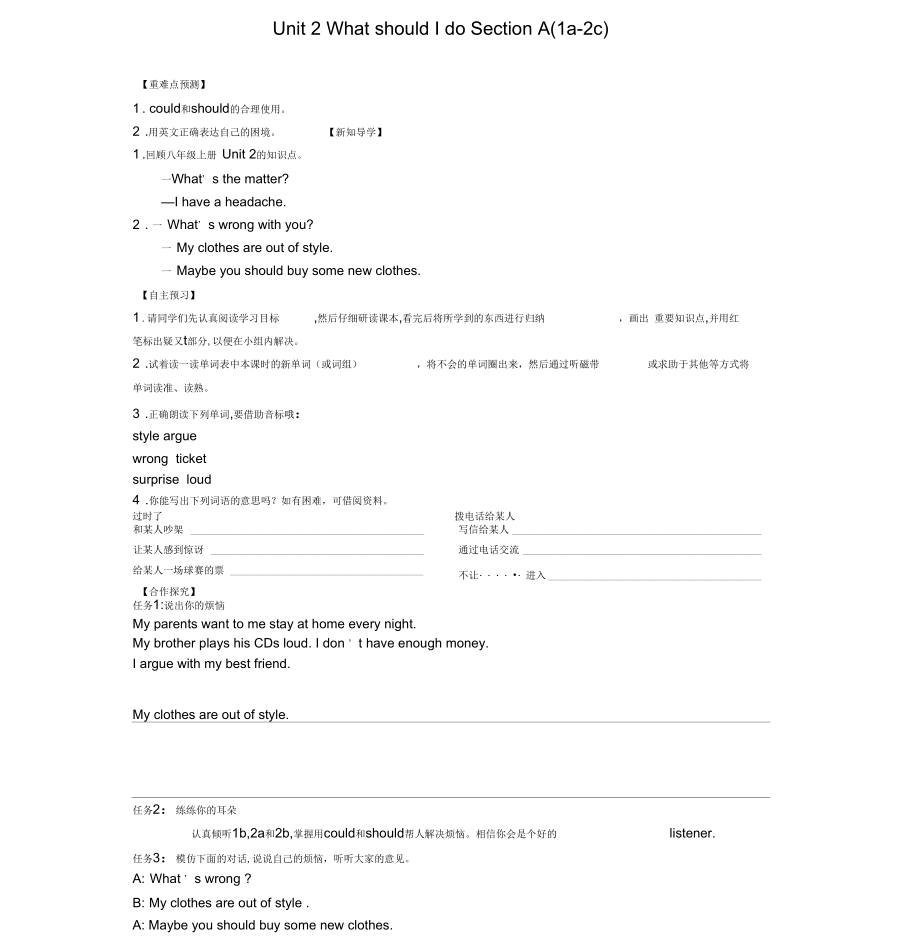《人教新目標(biāo)GoForIt!(2012)初中英語八年級(jí)下冊(cè)Unit2ISectionA導(dǎo)學(xué)案(二)》由會(huì)員分享����,可在線閱讀,更多相關(guān)《人教新目標(biāo)GoForIt!(2012)初中英語八年級(jí)下冊(cè)Unit2ISectionA導(dǎo)學(xué)案(二)(2頁珍藏版)》請(qǐng)?jiān)谘b配圖網(wǎng)上搜索�。
1、精品文檔
Unit 2 What should I do Section A(1a-2c)
【重難點(diǎn)預(yù)測(cè)】
1 . could和should的合理使用���。
2 .用英文正確表達(dá)自己的困境�����。 【新知導(dǎo)學(xué)】
1 .回顧八年級(jí)上冊(cè) Unit 2的知識(shí)點(diǎn)���。
一What s the matter?
—I have a headache.
2 . 一 What s wrong with you?
一 My clothes are out of style.
一 Maybe you should buy some new clothes.
【自主預(yù)習(xí)】
1 .請(qǐng)同學(xué)們先認(rèn)真
2、閱讀學(xué)習(xí)目標(biāo) ,然后仔細(xì)研讀課本,看完后將所學(xué)到的東西進(jìn)行歸納 ��,畫出 重要知識(shí)點(diǎn),并用紅
筆標(biāo)出疑又t部分,以便在小組內(nèi)解決�����。
2 .試著讀一讀單詞表中本課時(shí)的新單詞(或詞組) ,將不會(huì)的單詞圈出來���,然后通過聽磁帶 或求助于其他等方式將
單詞讀準(zhǔn)��、讀熟�。
3 .正確朗讀下列單詞,要借助音標(biāo)哦:
style argue
wrong ticket
surprise loud
4 .你能寫出下列詞語的意思嗎���?如有困難���,可借閱資料。
過時(shí)了 撥電話給某人
和某人吵架
讓某人感到驚訝
給某人一場(chǎng)球賽的票
【合作探究】
寫信給某人
通過電話交流
不讓
3���、??????進(jìn)入
任務(wù)1:說出你的煩惱
My parents want to me stay at home every night.
My brother plays his CDs loud. I don t have enough money.
I argue with my best friend.
My clothes are out of style.
任務(wù)2:練練你的耳朵
認(rèn)真傾聽1b,2a和2b,掌握用could和should幫人解決煩惱����。相信你會(huì)是個(gè)好的 listener.
任務(wù)3:模仿下面的對(duì)話,說說自己的煩惱�����,聽聽大家的意見�。
A: What
4、s wrong ?
B: My clothes are out of style .
A: Maybe you should buy some new clothes.
B:
A:
A:
考點(diǎn)聚焦
could 和 should
兩者都是情態(tài)動(dòng)詞�,后跟動(dòng)詞原形。 could是can的過去形式����,1)可以表示許可,委婉地 提出請(qǐng)求或給出建
議�����。 2)表示過去的能力���。 3)表示推測(cè)���,用于否定和疑問句中。 should
表示建議或給予勸告�����,還可以表示推測(cè)���。 should和could用來表示建議時(shí)�, 表示輕微地批評(píng)或遺憾�, 但could語氣更委婉客氣。 should意為“應(yīng)該,
5�、應(yīng)當(dāng)" ,could意為“可以,不妨”�����。 練一練:判斷選擇 could或should 1. You write him a letter.
2. Maybe you call him up.
3. You say you re sorry.
4. You go to his house.
.argue
一般作不及物動(dòng)詞�����,意為“爭(zhēng)吵” �。名詞形式為 argument 。常用的詞組有:
argue with … 禾和??爭(zhēng)吵 argue against … 反對(duì)?一
練一練:說說這些句子的英文意思
1 .不要跟你的父母爭(zhēng)吵�����,你父母會(huì)很傷心的�。
2 .你為什么老反對(duì)我呀?
學(xué)案整理】
Unit 2 What should I do ?
Section A ( 1a - 2c)
練一練: 1. could. 2. should/could 3. should 4. could
練一練: 1.Don t argue with your parents, or they will be sad.
2.Why do you always argue against me?
 人教新目標(biāo)GoForIt!(2012)初中英語八年級(jí)下冊(cè)Unit2ISectionA導(dǎo)學(xué)案(二)
人教新目標(biāo)GoForIt!(2012)初中英語八年級(jí)下冊(cè)Unit2ISectionA導(dǎo)學(xué)案(二)

